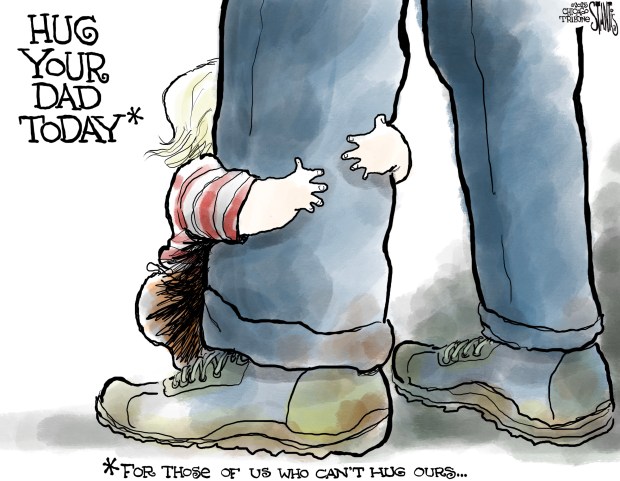Regarding the column “Is this the last chance for a cease-fire in Gaza?” (Aug. 20): The last-ditch negotiations between Israel and Hamas will still continue, because what is the alternative? Israel and Hamas, actually Israel and Hamas leader Yahya Sinwar, cannot agree on the last details, as an “either/or” plan leaves one side at a serious loss. There are other realities that make things even worse.
Since the recently recovered bodies of six male hostages were found to have bullets in them, meaning they were executed, it casts serious doubt on whether any hostages remain alive. Needless to say, why negotiate at all if no clear proof of living hostages is presented to Israel? Sinwar may be cunning, but hasn’t this thought entered his mind?
It’s the Iranian factor that is the unmentioned white elephant in the room, and likely Iran’s ayatollah could care less if Sinwar eventually stops breathing in some dusty, decaying tunnel. Sinwar is merely his pawn against Israel.
— Rosalie Lieberman, Chicago
New approach to Middle East
Columnist Elizabeth Shackelford (“Passing the torch to Harris could bring needed change to US-Israel policy,” Aug. 23) misses the point entirely when she advocates solely for a needed change to U.S.-Israel policy. What the incoming administration must do is to create a new perspective on Israel, but far more important is a change toward the Middle East as a whole.
An example: In the current conflict, many lives could have been saved if countries such as Egypt had temporarily opened their borders to Palestinians from Gaza who were seeking a safe place while warfare raged in their streets. These countries didn’t, and the U.S. remained mute. A serious strategic error. Countries in the Middle East need to join with the U.S. in creating a sustainable peace. They fail in that undertaking when they close their eyes to battles occurring on their borders.
Shackelford is correct in advocating for a change. But it must be a broader change or the battles in the streets of Gaza will occur again, and, once again, the United States will be searching for a policy that produces peace.
— Michael L. Weissman, Deerfield
Focus on hostages in Israel
Regarding the online story “Parents of American held by Hamas appeal for hostages’ release during Democratic National Convention” (Aug. 22): Kudos to Vice President Kamala Harris and Democratic National Convention organizers for refusing to be intimidated by anti-Israel protesters.
The emotional high point of the convention was a short but powerful speech by Chicago natives Rachel and Jon Goldberg-Polin, whose son, Hersh Goldberg-Polin, is one of more than 100 people (and one of eight Americans) who were kidnapped by Hamas during its barbaric Oct. 7 massacre in Israel. Hersh, 23, has been held hostage in Gaza for more than 320 days; his best friend, Aner Shapira, was killed. The convention’s response to the parents’ plea for their son and all of the hostages was thunderous and overwhelming: “Bring them home!”
The next day during her acceptance speech, Harris insisted she “will always stand up for Israel’s right to defend itself … because the people of Israel must never again face the horror that a terrorist organization called Hamas caused on Oct. 7, including unspeakable sexual violence and the massacre of young people at a music festival.” She made clear as well her commitment and President Joe Biden’s to securing the hostages’ release and achieving a better future for Israelis and Palestinians alike — an elusive but inescapable goal.
— Stephen A. Silver, San Francisco
Claypool’s remarks on CPS
I’m writing to update some of the information that Forrest Claypool references in his Aug. 6 op-ed (“Chicago’s renaissance under Richard M. Daley is at risk”) that describes achievement trends in Chicago and the rest of Illinois.
As much as I appreciate being cited in Claypool’s op-ed, Tribune readers need to know that the well-documented achievement renaissance that Chicago Public Schools experienced between 2001 and 2014 started to erode long before pandemic disruptions that began in the spring of 2020. State and national test data shows that Chicago’s widely publicized “extra year of growth” between third and eighth grade started to decline as early as 2014, a year before Mayor Rahm Emanuel appointed Claypool to be CPS CEO. That “extra year” got smaller during Claypool’s tenure as CEO, and it disappeared completely by the time Emanuel left office in 2019.
Moreover, recent reports by the Stanford Education Data Archive make it clear that declines in reading achievement between 2016 and 2019 were actually more than twice as large as COVID-19-related declines that occurred between 2019 and 2022.
It’s impossible to know for sure what caused achievement declines in CPS between 2014 and 2019. But it’s important to note that they coincided almost exactly with the period that CPS used NWEA’s MAP Growth testing system as the backbone for districtwide assessment and accountability policies in grades two through eight. This coincidence was part of what led CPS to discontinue its use of MAP testing and part of what led the Chicago Board of Education to insist on reinventing the district’s School Quality Rating Policy that relied heavily on MAP data.
Claypool’s op-ed makes it clear that he strongly disagrees with the changes in assessment and accountability policy that have been adopted by the current board and administration of CPS. But it’s important for Tribune readers to know that most independent experts in the national assessment community do not share his opinion.
In fact, some of these experts view what is currently happening in Chicago as a promising example of how assessment and accountability can be recast in ways that actively support improved teaching and learning. The National Council on Measurement in Education feels so strongly about this that it’s holding this year’s special conference on classroom assessment right here in Chicago at the Palmer House on Sept. 19 and 20. I’m hoping Claypool will be able to attend.
— Paul Zavitkovsky, statewide policy advocate and former Chicago Public Schools principal, Chicago
Letting kids have cellphones
In response to the Aug. 21 reprint, titled “About Cellphones in Schools,” of an excerpt by the Los Angeles Times Editorial Board, I ask this: Should we remove phones from the hands of students when they are the first line of defense against school shootings? If your child were locked down in a classroom, under attack from the outside, would you not want him or her to have a way to call 911 or, when it was over, to call you? Has a child in your house ever had a change of plans that would require them to stay late? Without a phone, they couldn’t notify you until you were already worried.
School is the setting to teach our children responsible life skills, one of which is balancing work-life activities, including when it is occupationally and socially appropriate to use phones.
Let’s not take away a child’s lifeline. Let’s teach them responsible use of it. We may even learn something ourselves.
— Jacqueline Powers, Mokena, Illinois
Submit a letter, of no more than 400 words, to the editor here or email letters@chicagotribune.com.




